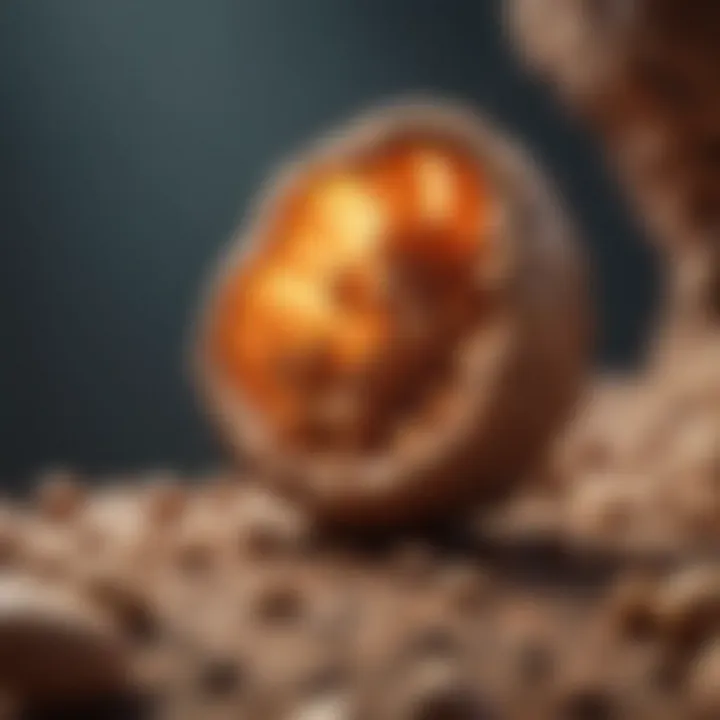Peanuts and Kidney Stones: Uncovering the Links


Intro
Kidney stones are a significant health concern, affecting millions of people globally. They are hard deposits made of minerals and salts that form inside the kidneys, often causing severe pain when passing. The connection between diet and kidney stone formation is a particularly complex area of study. Among various foods, peanuts have emerged as a source of interest for researchers and health professionals. This article delves into the relationship between peanut consumption and the risk of developing kidney stones, particularly focusing on calcium oxalate, a common component of kidney stones. By examining the nutritional profile of peanuts and relevant research findings, this discussion aims to provide a clearer picture of how dietary choices can influence kidney health.
Research Context
Background and Rationale
Understanding the dietary factors that contribute to kidney stone formation is crucial. Kidney stones, especially those made of calcium oxalate, can often be influenced by what individuals eat and drink. Peanuts are a popular snack that offer several health benefits. However, they also contain oxalates, compounds that can contribute to the formation of kidney stones in susceptible individuals. Thus, exploring the connection between peanuts and kidney stones carries significant implications for dietary recommendations.
Literature Review
The relationship between oxalate intake and kidney stone risk has been addressed in various studies. Research shows that high levels of dietary oxalate may increase the risk of stone formation. Specific studies have indicated that foods like spinach and chocolate, known for their high oxalate content, can lead to higher urinary oxalate levels. Of particular interest, peanuts have a moderate level of oxalate, which brings necessary scrutiny to their consumption. Recent findings suggest differing effects of peanut consumption on stone-forming individuals versus those without a history of stones. Further examination of these findings allows for a better understanding of dietary guidelines and personal choices.
Methodology
Research Design
The investigation into peanuts and kidney stones will involve a mix of observational and experimental studies. Observational studies will examine the dietary habits of individuals with a history of kidney stones and those without. This will help identify patterns in peanut consumption and stone formation rates. Experimental studies may also be conducted to analyze the biochemical impacts of peanuts on calcium oxalate levels in controlled environments.
Data Collection Methods
Data will be gathered from various sources. This includes:
- Clinical studies focusing on patients with kidney stones.
- Dietary surveys analyzing the intake of peanuts among different populations.
- Laboratory tests measuring urinary oxalate levels in subjects before and after peanut consumption.
Aggregating this data will enrich our understanding of how peanuts influence kidney stone risk and will ensure that the subsequent recommendations are evidence-based.
Intro
The connection between diet and health is a field of increasing interest, particularly concerning specific foods and their potential implications for conditions like kidney stones. Peanuts, often celebrated for their nutritional benefits, present a complex narrative when viewed through the lens of kidney health. This article aims to dissect the relationship between peanut consumption and the risk of developing kidney stones, a condition affecting millions worldwide.
Understanding this connection is crucial for multiple reasons. First, kidney stones can lead to significant discomfort and require medical intervention, making prevention paramount. By examining dietary factors, we can identify potential triggers and mitigators of kidney stone formation. Peanuts, rich in certain nutrients, warrant close examination due to their widespread consumption and nutritional profile.
Crucially, the nutritional benefits of peanuts must be weighed against their oxalate content. Oxalates are compounds that can contribute to the formation of calcium oxalate stones, the most prevalent type of kidney stones. Thus, understanding how peanuts fit into the larger dietary context can help inform both individuals at risk and health professionals regarding prudent dietary choices.
In this exploration, we will not only evaluate the nutritional aspects of peanuts but also relate them to the biochemistry of kidney stone formation. Integrating findings from recent research enhances our understanding, providing a comprehensive view of how peanuts may influence kidney health. This article ultimately seeks to inform readers about the complexities of diet and kidney stone risk, empowering them to make informed dietary decisions.
Understanding Kidney Stones
Kidney stones are hard deposits made of minerals and salts that form inside the kidneys. Understanding kidney stones is fundamental to discussing their connection to peanuts and dietary choices. This section will cover the definitions, types, epidemiology, risk factors, symptoms, and diagnosis of kidney stones, which are crucial for grasping how dietary components, like those found in peanuts, can influence their formation.
Definition and Types of Kidney Stones
Kidney stones, also known as renal calculi, vary in size and can cause significant discomfort. They primarily exist in four main types:
- Calcium stones: The most common type, typically made of calcium oxalate or calcium phosphate.
- Struvite stones: Usually formed in response to an infection, these stones may grow quickly and can become large.
- Uric acid stones: These stones form when urine is excessively acidic, and they are more common in people with gout.
- Cystine stones: These less common stones occur in individuals with a genetic disorder that causes cystine to leak into the urine.
Understanding the types of stones is essential as it helps guide prevention strategies and offers insights into dietary influences.


Epidemiology and Risk Factors
The prevalence of kidney stones has shown a marked increase globally. Factors contributing to this rise include dietary habits, hydration levels, and genetic predispositions.
Some notable risk factors include:
- Dehydration: Increased concentration of urine leads to higher chances of stone formation.
- Obesity: Higher body mass index (BMI) is associated with such stones.
- Dietary factors: High sodium and animal protein intake is linked to the elevated stone risk.
- History of urinary infections: It can lead to struvite stones.
Comprehending these epidemiological aspects provides a clearer picture of who is at risk and highlights the importance of nutritional choices, including the intake of peanuts.
Symptoms and Diagnosis
The symptoms of kidney stones can vary significantly. Many individuals do not experience symptoms until the stones move within the kidney or pass into the ureter. Common symptoms include:
- Severe pain: Often referred to as renal colic, this pain typically arises in the back flank and moves to the lower abdomen.
- Hematuria: Blood in the urine may occur due to irritation from the stone.
- Frequent urination and urgency: Particularly when a stone is in the bladder.
Diagnosis often involves imaging tests, such as CT scans or ultrasounds, alongside laboratory tests of urine and blood to assess mineral levels.
Understanding these symptoms and diagnostic procedures is key for those looking to manage kidney stone risk. The integration of dietary choices, including the consumption of peanuts, must consider these factors.
Nutritional Profile of Peanuts
Understanding the nutritional profile of peanuts is essential in discussing their connection to kidney stones. Peanuts are not only a popular snack but also pack significant nutrients that can contribute to overall health. Their composition can influence various bodily processes, including how they interact with kidney functions.
Peanuts are a rich source of healthy fats, protein, and fiber. They also contain various vitamins and minerals that benefit body functioning. Knowing the nutritional aspects lays the foundation for comprehending how they might relate to kidney stone formation or prevention.
Macro and Micronutrient Content
Peanuts are notable for their high content of macronutrients. Approximately 25% of peanuts consist of protein, making them an excellent option for vegetarians and those wanting to increase their protein intake without consuming meats. They have around 50% fat, primarily composed of unsaturated fats, which are beneficial for heart health.
In terms of micronutrients, peanuts provide:
- Vitamin E: An important antioxidant that helps protect cells from damage.
- Niacin: A B-vitamin crucial for energy metabolism and DNA repair.
- Folate: Essential for DNA synthesis and repair, especially important in pregnant individuals.
Furthermore, peanuts contain significant amounts of minerals like magnesium, phosphorus, and potassium, which support bone health, muscle function, and heart health.
Health Benefits of Peanuts
Peanuts offer several health benefits, some of which are important to discuss in the context of kidney health. These benefits include:
- Heart Health: The healthy fats in peanuts can help lower bad cholesterol levels.
- Weight Management: Despite being calorie-dense, peanuts can aid in satiety, helping control hunger.
- Blood Sugar Control: The fiber in peanuts can help regulate blood sugar levels, which is key for individuals with diabetes.
- Antioxidant Properties: Peanuts are a good source of antioxidants, which may help combat oxidative stress in the body.
While peanuts are nutritious, it is crucial to consume them in moderation, especially for individuals with a history of kidney stones. Their high fat and calorie content may lead to excessive dietary intake if not monitored. Understanding both the benefits and potential risks is vital for informed dietary choices.
Peanuts and Oxalates
Understanding the relationship between peanuts and oxalates is essential in evaluating dietary choices for kidney health. Oxalates are naturally occurring compounds found in many foods, including various nuts, vegetables, and fruits. They play a significant role in kidney stone formation, primarily calcium oxalate stones, which are the most common type of kidney stone. This section delves into the nature of oxalates, the oxalate content in peanuts, and the implications of this on kidney stone risk.
Understanding Oxalates
Oxalates are organic acids that are produced in the body and found in many plant foods. Consuming high-oxalate foods in excess can increase the risk of kidney stones because they can combine with calcium in the urine to form insoluble calcium oxalate crystals.


Amounts of oxalates vary across different food sources. In terms of kidney stone prevention, a balanced understanding of dietary oxalate is crucial. High oxalate intake may predispose certain individuals to stone formation, particularly those who are predisposed due to genetic factors or pre-existing conditions. Therefore, knowing what foods contain oxalates helps individuals manage their diets effectively to reduce potential risks.
Peanuts as a Source of Oxalates
Peanuts contain a moderate amount of oxalates compared to other common foods. A typical serving of peanuts (about 28 grams) contains roughly 5 to 10 milligrams of oxalates. This level is significant enough to be mindful of, especially for those who are prone to developing kidney stones. While peanuts offer various nutrients and health benefits, individuals at risk must consider balancing their intake appropriately.
Moreover, peanuts can be part of a healthy diet, providing protein, vitamins, and healthy fats. However, if one has a history of kidney stones, monitoring oxalate consumption, including peanuts, is recommended. Choosing a variety of low-oxalate foods alongside peanuts may help maintain balance in the diet.
Impact of Oxalates on Kidney Stone Formation
The connection between oxalates and kidney stones is based on the ability of oxalate to bind with calcium in urine, leading to the formation of crystals. When the urine becomes supersaturated with calcium and oxalate, it can precipitate these compounds, forming stones over time.
Several factors can influence this process:
- Hydration: Increased fluid intake dilutes urine and may help prevent stone formation.
- Diet Composition: A diet high in calcium may help bind oxalates in the intestine, reducing their absorption and subsequent excretion in urine.
- Individual Metabolism: Genetic predispositions can lead to greater oxalate production, increasing kidney stone risk, regardless of dietary intake.
Crucially, not everyone who consumes high-oxalate foods will develop kidney stones. Individual risk factors and overall dietary patterns play a more crucial role in determining one’s stone-forming potential. Those concerned about their dietary oxalate intake, particularly regarding peanuts, should consider consulting healthcare professionals for tailored advice.
Research Studies on Peanuts and Kidney Stones
Understanding the relationship between peanut consumption and kidney stone formation is an essential part of this discourse. Research studies provide crucial insights into dietary influences on kidney health. They may assist in identifying potential risk factors and offer a scientific basis for dietary recommendations.
Recent findings from various studies can shed light on whether peanuts might play a role in either exacerbating or alleviating the risk of kidney stones. This is particularly important for individuals who have experienced renal stones in the past or who have heightened susceptibility due to genetic or lifestyle factors. Analyzing dietary trends regarding peanuts is also pertinent, given their unique nutritional profile.
Recent Findings
Recent research into the connection between peanuts and kidney stones indicates that peanuts may not be as harmful as once believed. Studies have shown that while peanuts do contain oxalates, the presence of other beneficial nutrients may counteract potential risks. The nutritional density of peanuts includes protein, healthy fats, and various vitamins and minerals that contribute positively to overall health.
A study published in the American Journal of Kidney Diseases evaluated dietary habits and their correlation with kidney stone formation. Results suggested that moderate peanut consumption did not correlate with an increased risk, and instead, it might help in maintaining balanced calcium oxalate levels in the body.
"Incorporating moderate amounts of peanuts into one’s diet may pose no significant risk in those predisposed to kidney stones, and could potentially offer health benefits."
Longitudinal studies are necessary to draw more definitive conclusions, yet these findings present a promising outlook.
Analysis of Dietary Patterns
Understanding dietary patterns is key to managing kidney stone risks. Both the quantity and quality of diet significantly affect health outcomes. Recent studies analyzed groups of individuals with recurrent kidney stones against those without. They noted that diets high in fruits, vegetables, and modest amounts of nuts—including peanuts—demonstrated lower incidences of stone formation.
Including peanuts in a balanced diet can provide healthy fats and proteins, which may help in keeping a diverse nutrient profile. Some research suggests including peanuts and similar legumes in daily meals not only benefits kidney health but also helps in weight management and blood sugar control. Such benefits are essential, considering obesity and diabetes are both risk factors for kidney stone development.
Dietary Recommendations for Kidney Stone Prevention
Dietary considerations play a crucial role in managing the risk of kidney stone formation. Given the complexities surrounding kidney stones, a tailored diet can significantly influence their development and recurrence. The focus should not only be on avoiding particular foods but on ensuring a balanced intake of nutrients that support kidney health. Keeping hydration levels optimal is critical, as it helps dilute substances that contribute to stone formation.
Each individual's dietary needs may vary. Therefore, it is essential to consider personal medical history, lifestyle, and specific dietary requirements when making choices.
General Guidelines for Dietary Choices
When aiming to prevent kidney stones, several fundamental dietary guidelines should be kept in mind:
- Stay Hydrated: Aim for at least 2 to 3 liters of water a day. Proper hydration reduces urine concentration and helps in flushing out potential stone-forming substances.
- Limit Sodium Intake: High sodium levels can lead to increased calcium in the urine, which is a risk factor for calcium stone formation. It's advisable to consume less than 2,300 mg of sodium daily.
- Moderate Oxalate Intake: Foods high in oxalates, such as spinach, nuts, and beets, can elevate the risk of calcium oxalate stones. Being aware of oxalate content in foods aids long-term dietary choices.
- Adequate Calcium Consumption: Contrary to what might be assumed, it is important to maintain a reasonable level of dietary calcium. Low calcium intake can lead to elevated oxalate absorption, increasing the risk of stones. Aim for 1,000 mg to 1,200 mg per day from dietary sources.
- Balance Protein Sources: High protein diets, particularly animal proteins, may increase stone risk. Favoring plant-based sources while moderating overall protein intake can be beneficial.
- Include Fruits and Vegetables: A diet rich in fruits and vegetables can help in reducing stone risk. They provide necessary vitamins and minerals, and their alkaline nature helps in balancing urine pH.
- Limit Sugar and High-Fructose Intake: Added sugars and high-fructose corn syrup can elevate stone risk. Keeping these low in the diet is advisable.


A diet rich in hydration, balanced nutrients, and moderated substances will go a long way in kidney stone prevention.
The Role of Peanuts in a Balanced Diet
Peanuts can be an essential component of a balanced diet, particularly when considering their nutritional profile and benefits. While they contain oxalates, their overall contribution to health should not be overlooked. Here are some points regarding peanut consumption in the context of kidney stone prevention:
- Nutrient-Rich: Peanuts are a good source of healthy fats, protein, fiber, and various vitamins and minerals including vitamin E and magnesium. These nutrients support overall well-being.
- Protein Source: As a plant-based protein, peanuts may serve as an alternative to animal proteins, which can increase calcium levels in urine.
- Moderating Oxalate: While peanuts have some oxalate content, when consumed in moderation as part of a varied diet, they are unlikely to significantly increase stone risk.
- Potential Benefits: Peanuts are linked with heart health and may help in managing weight. Healthy weight is crucial as obesity is a risk factor for kidney stone formation.
Personal Considerations
Understanding the personal considerations related to peanut consumption and kidney stone risk is essential for individuals who may be vulnerable to developing these stones. Each person's dietary needs and health status can vary significantly, and as such, tailoring dietary choices is crucial. When addressing kidney stones, factors such as individual risk factors and overall health status play a significant role in making informed decisions. This section aims to explore these elements to help individuals navigate their dietary choices effectively.
Individual Risk Factors and Health Status
Various individual risk factors can affect the likelihood of developing kidney stones. Genetics, hydration levels, and metabolic conditions often determine one's predisposition to stones. For example, a family history of kidney stones can increase one's risk, highlighting the need for personalized dietary adjustments.
Certain health conditions, such as hypercalciuria (high calcium levels in urine) or primary hyperoxaluria, can lead to upswing in stone formation. Understanding these conditions is fundamental for individuals, especially those who enjoy peanuts, which contain oxalates. Here are some key risk factors:
- High levels of oxalates in diet: Foods like spinach, beets, and certain nuts, including peanuts, contribute to overall oxalate intake.
- Previous kidney stone history: A past incidence often drives individuals to adjust their diet significantly.
- Dehydration risks: Insufficient water intake can exacerbate the risk of stone formation, irrespective of diet.
Ultimately, individual health status should inform decisions about peanut consumption. Consulting healthcare professionals can elucidate these personal factors further.
Consulting Healthcare Professionals
Before making any significant dietary changes, especially for those with a history of kidney stones, consulting healthcare professionals is advisable. Whether a nutritionist, a dietitian, or a urologist, experts can provide tailored guidance based on individual health assessments. Here are a few points underscoring the importance of such consultations:
- Personalized dietary assessment: Professionals can assess individual risk factors and recommend specific dietary adjustments relevant to peanut consumption.
- **Monitoring
Culmination
The exploration of the relationship between peanut consumption and the formation of kidney stones reveals multiple dimensions of dietary influence on health. This article sheds light on several crucial aspects that deserve attention.
First, understanding the nutritional profile of peanuts offers insights into their role within a balanced diet. Peanuts provide essential nutrients like proteins, healthy fats, vitamins, and minerals. These contribute positively to overall health, but potential links to oxalate content must be considered when evaluating dietary choices for kidney stone prevention.
Second, the significance of oxalates cannot be overstated. As discussed, oxalates have a complex relationship with kidney stone formation. Peanuts do contain oxalates, but their impact is less clear-cut than often assumed. This nuance is essential for patients and health practitioners as they navigate dietary recommendations.
Additionally, personal considerations play an important role in this context. Each individual has unique risk factors and health status that can influence how dietary choices affect kidney stone risk. Consulting healthcare professionals can provide tailored advice that considers all relevant factors.
In summary, the findings of this article underscore the necessity of a balanced view regarding peanuts and kidney stones. While certain narratives may simplify the connection between diet and health, complex interactions exist that require thorough understanding. By equipping readers with this knowledge, the article aims to contribute to informed decisions about diet and kidney health, ultimately supporting efforts to reduce kidney stone incidence.
"Nutritional choices are fundamental, but they must be tailored to individual health contexts."
This holistic approach not only emphasizes the benefits of incorporating peanuts into one’s diet but also advocates for awareness of potential pitfalls. As research progresses, continuous evaluation of dietary guidelines will enhance our understanding and application of nutrition in the context of kidney stone prevention.
Importance of References
References indicate the origin of scientific claims, dietary recommendations, and any assertions made throughout the text. In discussing the relationship between peanuts and kidney stones, various studies and articles were consulted. These references help construct a narrative that is not only informative but also evidence-based. This is vital for an audience that values academic rigor.
Specific Elements of References
- Source Credibility: Reliable sources such as peer-reviewed journals or authoritative health organizations should be prioritized. This ensures that the article’s claims are backed by recognized research. For example, citing publications from the Journal of Urology or data from the National Institute of Diabetes and Digestive and Kidney Diseases strengthens the influential nature of the article.
- Diverse Perspectives: It is essential to include different viewpoints or findings about peanuts and kidney stones. For instance, while some studies may highlight the oxalate content in peanuts, contrasting research might discuss their beneficial nutrients. By presenting a spectrum of research, readers gain a more comprehensive understanding of the issues.
- Guidance for Further Reading: References can serve as a springboard for readers seeking more detailed information. Including supplemental literature or guidelines allows them to delve deeper into specific areas of interest. This empowers readers, equipping them with knowledge and resources.
"Citations not only support facts; they also construct a pathway to knowledge for the reader."
End on References
In sum, the references in this article function as a foundation. They are not merely an afterthought but a critical element that lends weight to the arguments made. As the discourse around diet and kidney health evolves, these references will continue to play a key role in shaping our understanding of the intricate relationship between dietary choices—like peanut consumption—and kidney stone formation. The importance of rigorous referencing cannot be overstated for an academic audience that seeks clarity and precision.



